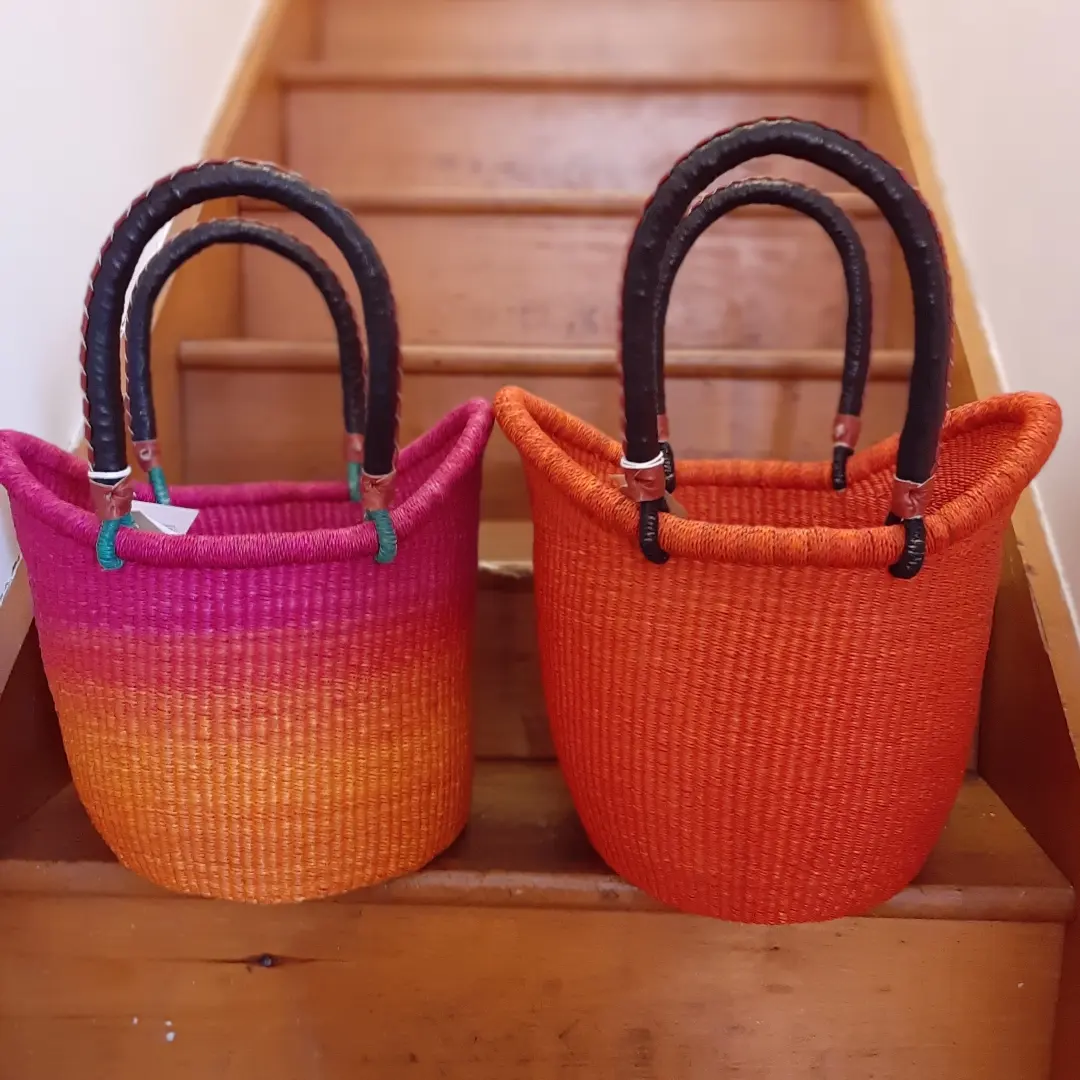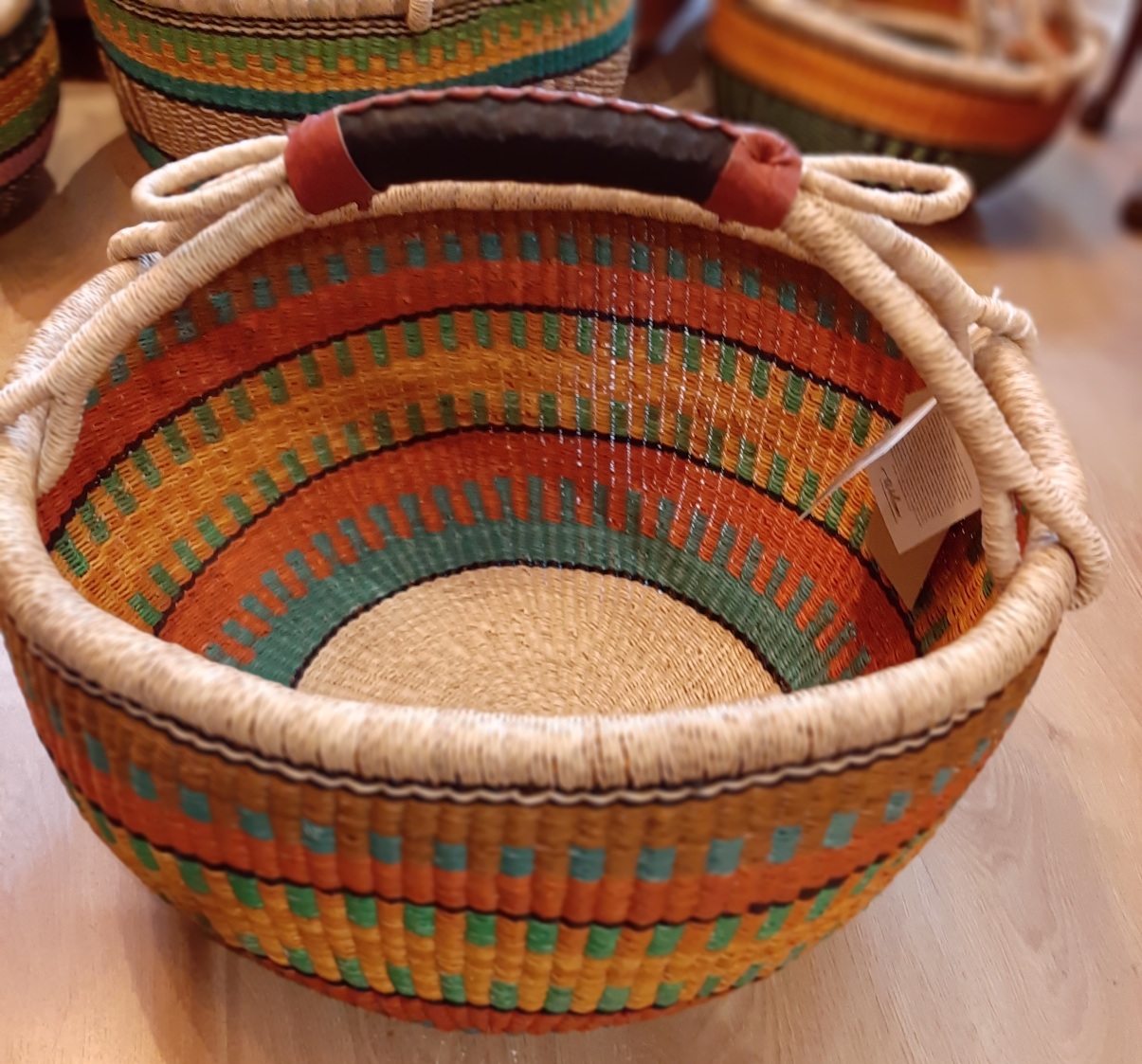Our new Baba Tree African basket collection
I am very happy to introduce you to the new addition to our product range - Baba Tree African baskets in various styles. We have Nyariga Market baskets, Bolga Round baskets and more! I have been looking for reliable quality supplier for these baskets for some time and so glad I came across Baba Tree Company. I was impressed with their honesty, ethics and quality of the baskets they produce.
One of the things, which made me choose Baba Tree Baskets over and above possibly slightly cheaper suppliers was their absolute openness about production of baskets, what processes are involved, how they treat and pay their skilled weavers. In stead of me going on about them, here are extracts of the information, which I would like to share with you to make you appreciate not only the beauty of the traditional Nyariga and Bolga Baskets, but think about where and how they are made.
About Baba Tree Baskets
The Baba Tree Basket Co has been preserving the culture of baskets and the Gurunsi community in Bolgatanga for the last 15 years. It’s here that an exquisitely woven Baba Tree community of over 250 artisans practice a time-honoured weaving technique using elephant grass and their very own “rhythm and flow”. Each basket comes directly from the hands of the artisan weavers - energetic, colourful, purposeful. Each luscious curve is the handprint or signature of the weaver who has expertly handcrafted your basket, we celebrate the unique differences in each and every piece.
Founder Gregory MacCarthy started weaving stories with baskets a few years after he first took steps in Ghana in 1999 with the significant understanding that good design can and will change people’s lives. The Baba Tree Basket Company continues this ongoing commitment to the artisan weavers through the progressive creation of sustainable jobs, fair and meaningful work and true social impact in the local community. Already they have created so much positive change and progress in their time on the ground in Bolgatanga, a remote town in the Upper East Region of Ghana, otherwise known as ‘’the city of baskets’’!
The original desire to celebrate the creativity and excellence of the Gurunsi people has never felt more significant as Baba Tree continues to focus on creating income earning opportunities for the Gurunsi artisans we collaborate with and a global marketplace to celebrate their incredible craftsmanship. Honouring local basket traditions and creating exciting forms with the oldest craft in the world is what Baba Tree does best! New patterns, techniques and dye materials emerge over time as they continue to innovate, evolve and understand better the elephant grass weavers so exquisitely weave by hand.
How are the Baba Tree baskets including Bolga baskets, Nyariga baskets made?
It’s quite a process…
The weaver will buy different sizes of straw – some for the inside verticals (warps), some for the cross woven horizontals (wefts), some for coil that travels the circumference of the basket, and some straw is purchased for the handles. The weaver then splits a piece of straw into two pieces. These two pieces of straw are dampened with water and are then rolled together over a person’s thigh using the palm of their hand – or over an old rubber sandal tied to the thigh or a rubber sandal tied to a piece of wood (the Baba Tree has created special ergonomically sensitive benches for our weavers) and this action creates one piece of straw. This is done so that the straw becomes soft and malleable.
This takes a day to accomplish. Many weavers engage members of their households to help them. It’s a big job… generally, two bundles of straw can be split and rolled in a day. Some baskets might take two bundles of straw and others might take six bundles of straw. For the newer styles of Baba Tree baskets, we have factored in the days it takes to prepare straw for dyeing in the prices that we pay our weavers.
Before dyeing, these two pieces of straw that have been rolled together to create one piece of straw – are then unrolled – once again creating two pieces of straw so that the dye can penetrate the straw easily.
The Baba Tree dyes all the straw for it’s weavers which has a few benefits which include:
- Our weavers save money on firewood, or time gathering firewood.
- Our weavers save money on dye and salt.
- Our weavers save time by not having to fetch water for dyeing.
- The Baba Tree is able to control the dyeing process which results in accurate colour control and accurate dyeing
- The Baba Tree draws out most of the designs for the weavers with crayons (a big job) and is able to control the aesthetic. The weaver knows exactly what is needed and there is a lot less hit and miss in terms of colour design.
Dyeing our weavers straw increases our costs considerably. At the same time, it saves our weavers' precious amounts of money.
As mentioned, this all results in a more beautiful product.
The reason why Baba Tree ‘’Bowls’’ (a round basket with no handle) are almost as expensive as our ‘’Round’’ baskets is that during the dyeing process, we damage a few baskets which increase the cost of producing Bowls.
It’s the same thing with our dip-dyed Nyariga baskets. They are more expensive because of all the associated costs of dip dyeing them let alone the fact that we lose up to 20% of our baskets during the dyeing process. 
To weave a finely woven 16" Baba Tree ‘Round’ Bolga basket it takes about 25,000 'knots' – where warp meets weft – to complete the basket up to the point before the 'coil' starts.

The weavers will complete the base of the basket and weave about three inches up the sides. Most weavers will then turn the basket over and attach a piece of string to the center of the base and attach the string overhead so that the baskets hang in front of them.
In this position, with the basket seemingly floating in the air, the weaver continues to weave the sides of the baskets up to the point where the coil joins the main body of the piece. The coil runs the circumference of the basket where the handles are looped through. The coil must be neat and strong with no spaces – or very little space – between the main body of weaving and the coil.
During weaving, the weaver constantly flicks water onto the basket or has the straw soaking in water for a short time. Again, this is to keep the straw malleable. With the coil, it is no different. The thicker straw that they utilize for the coil is constantly dampened as the weaver pulls hard to compress the straw around the coil.
Once a weaver has completed a neat and strong coil, they take a razor blade and trim all the superfluous straw from the basket – or they will do this a few times during the course of the job. If this job is done very well, you will see very few extraneous bits of straw sticking out from the basket once a customer has soaked the basket for reshaping.
If the weaver was sloppy with this process, you will see a lot of straw sticking out after the basket has dried after it has been reshaped with water. It’s hard for us to pick up on this sloppiness when we are buying. You can use scissors to cut off these pieces.
Then, a neat and very strong handle has to be constructed. This is not an easy task – especially for round baskets that will be subjected to strength testing by the Baba Tree.
The handle has to be as smooth as possible so our leather guys can achieve a clean and neat finish on the handle. The weavers are supposed to bring baskets to us with the handles bone dry though this rarely happens. We need the handles to be dry in order to strength test them simply by pulling on them very hard. You can’t do that when the handle is wet.
The weavers can’t wait three days for the handles to dry before bringing them. They want to get paid ASAP. If the baskets are brought with wet handles we pay the weavers for the baskets but deduct money for the handles. We then let the handles sit in a special drying room to sit for three days. After three days we strength test the handles and if they pass the weaver is given the balance owed for the baskets.
If the handle doesn’t pass, we keep the deducted money and use it to pay one of our handle specialists to reconstruct the handle. Often you will see low-quality Bolga baskets where the handle obviously isn’t strong to the point where a piece of thin nylon rope, running underneath a very sloppy leather job, tied to each end of the handle in a vain attempt to give the handle strength.
Currently, we are encouraging many of our weavers to bring the baskets without handles, especially if they are not good at doing handles – so they don’t waste their time, and straw, on handles that never pass our test.
The loops that you see jutting from the handles on our round baskets were supposedly designed to hold open wine bottles upright in the basket. Nowadays, none of the weavers know what the loops are for and very few baskets have loops in the exact dimensions needed to support an open wine bottle upright.
To weave a high-quality 16” Baba Tree ‘Round’ basket takes about 2.5 to 4 days – which doesn't include two and a bit days of straw preparation.
Once the basket handles are completely dry the baskets are given to the leather team who will then strength test the handles, again, before applying leather to them.
Once the leatherwork is complete, the handles are allowed to dry before being put into storage.
Only the best quality goat leather is purchased.
The leather scraps and offcuts are used to make the rope for our hats. We give the scraps to the rope makers and then they sell the ropes to us.
The Baba Tree has been working with the same leather team for almost 15 years.
We don’t do ‘vegan’ products because the leather on our basket handles holds everything in place and makes the handles much stronger. If leather wasn’t used then the integrity of the handle would be compromised. The handle might break or the straw will unravel.
Thanks for taking the time to read this.